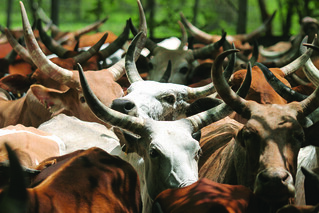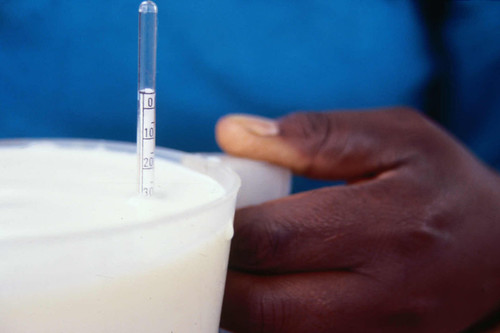 |
| Cattle being watered at the Ghibe River in southwestern Ethiopia. The country's livestock sector supports the livelihoods of a large proportion of rural households (photo credit: ILRI/Stevie Mann). |
On 18-24 August 2012, some 1000 agricultural economics experts from around the world met in Foz do Iguaçu, Brazil for the 28th triennial International Conference of Agricultural Economists. The conference was organized by the International Association of Agricultural Economists (IAAE).
Under the theme, The Global Bio-Economy, the conference discussed several global challenges affecting the bio-economy, including food insecurity, natural resource management and food price crises, and possible ways of addressing these challenges.
A team of researchers from the International Livestock Research Institute (ILRI) attended the meeting and presented papers on various aspects of agricultural economics in developing countries, including the role of livestock in the Ethiopian economy, the competitiveness of smallholder pig producers in Vietnam and economic impact assessment of avian influenza control measures in Nigeria.
Other presentations covered the opportunities for intra-regional trade in staple food crops in the Common Market for Eastern and Southern Africa (COMESA) region, the effects of decentralized forest management on household farm forestry in Kenya and the Gender, Agriculture and Assets Project, a research initiative jointly led by the International Food Policy Research Institute (IFPRI) and ILRI aimed at better understanding gender and asset dynamics in agricultural development programs.
Under the theme, The Global Bio-Economy, the conference discussed several global challenges affecting the bio-economy, including food insecurity, natural resource management and food price crises, and possible ways of addressing these challenges.
A team of researchers from the International Livestock Research Institute (ILRI) attended the meeting and presented papers on various aspects of agricultural economics in developing countries, including the role of livestock in the Ethiopian economy, the competitiveness of smallholder pig producers in Vietnam and economic impact assessment of avian influenza control measures in Nigeria.
Other presentations covered the opportunities for intra-regional trade in staple food crops in the Common Market for Eastern and Southern Africa (COMESA) region, the effects of decentralized forest management on household farm forestry in Kenya and the Gender, Agriculture and Assets Project, a research initiative jointly led by the International Food Policy Research Institute (IFPRI) and ILRI aimed at better understanding gender and asset dynamics in agricultural development programs.

